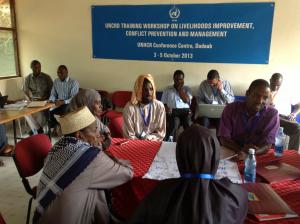 Dates: 30 September - 5 October 2013
Dates: 30 September - 5 October 2013
Place: Dadaab, Northern Kenya
Rationale for Capacity building for Conflict Prevention
The rationale for capacity building and conflict management is to empower both the refugees and host communities through exchange of information, promotion of knowledge and building of skills for improved livelihoods, and to enable them deal with conflicts in a sustainable manner. UNCRD has therefore designed the Capacity Building programme for Somali Refugees in Kenya which is inclusive of host community living in proximity in the environs of the Dadaab refugee camp. The areas of training for capacity building comprise:
- Enhanced knowledge and competency of refugees and host communities about conflict prevention and management.
- Strengthen local communities and refugees capacity to protect the environment and vegetation.
The rationale for capacity building and conflict management, therefore, is to empower both the refugees and host communities through exchange of information, promotion of knowledge and building of skills for improved livelihoods, and to enable them deal with conflicts in a sustainable manner.
Workshop Focus
The main focus of this particular capacity training workshop is Enhanced Knowledge and Competency for Conflict Prevention and Management and alternative livelihood creation for sustainable peace. The underlying programme thinking is that to have mutual understanding, agreement and commitment to community harmony requires embarking on programmes that secure sustainable development while livelihood creation programmes are central to successful conflict resolution leading to sustainable development. Lack of alternative livelihood is a common source of conflict.
Objectives
The main objective of the training workshop is to impart knowledge and build the competency of the refugees and the host community in Conflict Prevention and Management. More specifically, the training workshop aims at:
1. Examining the general causes and impacts of conflict in the area;
- The dynamics of conflicts over resource use and control;
- The role of culture and traditions in conflict;
- Conflict between different clans and ethnic groups;
- Conflict between refugees and the host community; and
- The impact of conflict on life and property.
2. Enhancing capabilities for use of conflict resolution tools and mechanisms
- The role of traditional conflict resolution mechanisms and faith-based organization;
- The role of local administration and peace committees
- The role of elders, women and youth in conflict prevention and management.
3. Identification of alternative livelihoods and paths to sustainable peace.
Expected Outputs
- The causes and effects of conflict identified;
- Refugees and host community trained in conflict management and prevention;
- Requisite knowledge imparted on strategies for livelihood creation; and
- Members of host community and refugees embrace mutual understanding and
- harmony as a prerequisite for peace and sustainable development.
(Office: UNCRD Africa Office)

